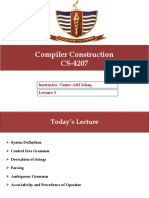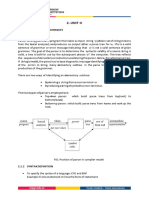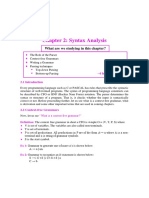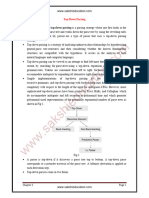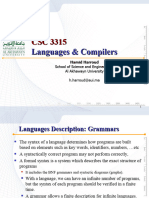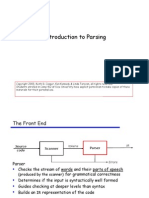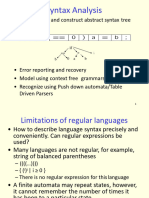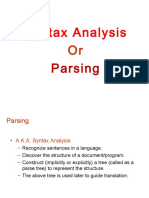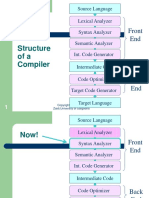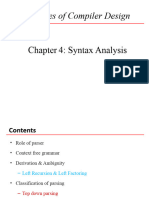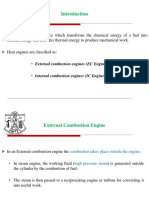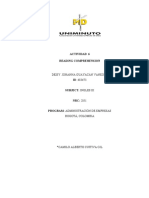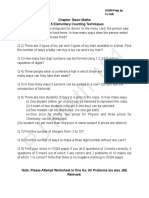Lecture 6
Uploaded by
divyanshjLecture 6
Uploaded by
divyanshjLecture 6
Syntax Analysis
Awanish Pandey
Department of Computer Science and Engineering
Indian Institute of Technology
Roorkee
January 31, 2025
January 31, 2025 1 / 19
Take aways from the last class
Extended regular expressions
January 31, 2025 2 / 19
Take aways from the last class
Extended regular expressions
Lexical Analyzer generator
January 31, 2025 2 / 19
Take aways from the last class
Extended regular expressions
Lexical Analyzer generator
Lex file format and compilation steps
January 31, 2025 2 / 19
Take aways from the last class
Extended regular expressions
Lexical Analyzer generator
Lex file format and compilation steps
Working principle of the lex
January 31, 2025 2 / 19
Take aways from the last class
Extended regular expressions
Lexical Analyzer generator
Lex file format and compilation steps
Working principle of the lex
Correctness check of a string based on lex rules
January 31, 2025 2 / 19
Take aways from the last class
Extended regular expressions
Lexical Analyzer generator
Lex file format and compilation steps
Working principle of the lex
Correctness check of a string based on lex rules
Interface with other passes
January 31, 2025 2 / 19
Overview of Syntax Analysis
Check syntax and construct abstract syntax tree
January 31, 2025 3 / 19
Overview of Syntax Analysis
Check syntax and construct abstract syntax tree
Error reporting and recovery
January 31, 2025 3 / 19
Overview of Syntax Analysis
Check syntax and construct abstract syntax tree
Error reporting and recovery
Model using context-free grammars
January 31, 2025 3 / 19
Overview of Syntax Analysis
Check syntax and construct abstract syntax tree
Error reporting and recovery
Model using context-free grammars
Recognize using push-down automata/table-driven Parsers
January 31, 2025 3 / 19
Overview of Syntax Analysis
Check syntax and construct abstract syntax tree
Error reporting and recovery
Model using context-free grammars
Recognize using push-down automata/table-driven Parsers
To check whether variables are of types on which operations are allowed
January 31, 2025 3 / 19
Overview of Syntax Analysis
Check syntax and construct abstract syntax tree
Error reporting and recovery
Model using context-free grammars
Recognize using push-down automata/table-driven Parsers
To check whether variables are of types on which operations are allowed ✗
January 31, 2025 3 / 19
Overview of Syntax Analysis
Check syntax and construct abstract syntax tree
Error reporting and recovery
Model using context-free grammars
Recognize using push-down automata/table-driven Parsers
To check whether variables are of types on which operations are allowed ✗
To check whether a variable has been declared before use
January 31, 2025 3 / 19
Overview of Syntax Analysis
Check syntax and construct abstract syntax tree
Error reporting and recovery
Model using context-free grammars
Recognize using push-down automata/table-driven Parsers
To check whether variables are of types on which operations are allowed ✗
To check whether a variable has been declared before use ✗
January 31, 2025 3 / 19
Overview of Syntax Analysis
Check syntax and construct abstract syntax tree
Error reporting and recovery
Model using context-free grammars
Recognize using push-down automata/table-driven Parsers
To check whether variables are of types on which operations are allowed ✗
To check whether a variable has been declared before use ✗
To check whether a variable has been initialized
January 31, 2025 3 / 19
Overview of Syntax Analysis
Check syntax and construct abstract syntax tree
Error reporting and recovery
Model using context-free grammars
Recognize using push-down automata/table-driven Parsers
To check whether variables are of types on which operations are allowed ✗
To check whether a variable has been declared before use ✗
To check whether a variable has been initialized ✗
January 31, 2025 3 / 19
Overview of Syntax Analysis
Check syntax and construct abstract syntax tree
Error reporting and recovery
Model using context-free grammars
Recognize using push-down automata/table-driven Parsers
To check whether variables are of types on which operations are allowed ✗
To check whether a variable has been declared before use ✗
To check whether a variable has been initialized ✗
These issues will be handled in semantic analysis
January 31, 2025 3 / 19
Derivation
Does 9 − 5 + 2 belong to the following grammar?
list → list + digit
|list − digit
|digit
digit → 0|1|2 . . . |9
January 31, 2025 4 / 19
Derivation
Does 9 − 5 + 2 belong to the following grammar?
list → list + digit
|list − digit
|digit
digit → 0|1|2 . . . |9
String Derivation:
January 31, 2025 4 / 19
Derivation
Does 9 − 5 + 2 belong to the following grammar?
list → list + digit
|list − digit
|digit
digit → 0|1|2 . . . |9
String Derivation:
list → list + digit
January 31, 2025 4 / 19
Derivation
Does 9 − 5 + 2 belong to the following grammar?
list → list + digit
|list − digit
|digit
digit → 0|1|2 . . . |9
String Derivation:
list → list + digit
list → list − digit + digit
January 31, 2025 4 / 19
Derivation
Does 9 − 5 + 2 belong to the following grammar?
list → list + digit
|list − digit
|digit
digit → 0|1|2 . . . |9
String Derivation:
list → list + digit
list → list − digit + digit
list → digit − digit + digit
January 31, 2025 4 / 19
Derivation
Does 9 − 5 + 2 belong to the following grammar?
list → list + digit
|list − digit
|digit
digit → 0|1|2 . . . |9
String Derivation:
list → list + digit
list → list − digit + digit
list → digit − digit + digit
list → 9 − digit + digit
January 31, 2025 4 / 19
Derivation
Does 9 − 5 + 2 belong to the following grammar?
list → list + digit
|list − digit
|digit
digit → 0|1|2 . . . |9
String Derivation:
list → list + digit
list → list − digit + digit
list → digit − digit + digit
list → 9 − digit + digit
list → 9 − 5 + digit
January 31, 2025 4 / 19
Derivation
Does 9 − 5 + 2 belong to the following grammar?
list → list + digit
|list − digit
|digit
digit → 0|1|2 . . . |9
String Derivation:
list → list + digit
list → list − digit + digit
list → digit − digit + digit
list → 9 − digit + digit
list → 9 − 5 + digit
list → 9 − 5 + 2
January 31, 2025 4 / 19
Derivation
Does 9 − 5 + 2 belong to the following grammar?
list → list + digit
|list − digit
|digit
digit → 0|1|2 . . . |9
String Derivation:
list → list + digit
list → list − digit + digit
list → digit − digit + digit Which non-terminal should I choose?
list → 9 − digit + digit
list → 9 − 5 + digit
list → 9 − 5 + 2
January 31, 2025 4 / 19
Derivation
Does 9 − 5 + 2 belong to the following grammar?
list → list + digit
|list − digit
|digit
digit → 0|1|2 . . . |9
String Derivation:
list → list + digit
list → list − digit + digit
list → digit − digit + digit Which non-terminal should I choose?
list → 9 − digit + digit Which production rule should I select?
list → 9 − 5 + digit
list → 9 − 5 + 2
January 31, 2025 4 / 19
Derivation
If there is a production A → α then we say that A derives α and is denoted by A ⇒ α
January 31, 2025 5 / 19
Derivation
If there is a production A → α then we say that A derives α and is denoted by A ⇒ α
αAβ ⇒ αγβ if A → γ is a production
January 31, 2025 5 / 19
Derivation
If there is a production A → α then we say that A derives α and is denoted by A ⇒ α
αAβ ⇒ αγβ if A → γ is a production
If α1 ⇒ α2 ⇒ · · · ⇒ αn then α1 ⇒+ αn
January 31, 2025 5 / 19
Derivation
If there is a production A → α then we say that A derives α and is denoted by A ⇒ α
αAβ ⇒ αγβ if A → γ is a production
If α1 ⇒ α2 ⇒ · · · ⇒ αn then α1 ⇒+ αn
If S ⇒+ α where α is a string of terminals and non-terminals of G then we say that α is
a sentential form of G.
January 31, 2025 5 / 19
Derivation
If there is a production A → α then we say that A derives α and is denoted by A ⇒ α
αAβ ⇒ αγβ if A → γ is a production
If α1 ⇒ α2 ⇒ · · · ⇒ αn then α1 ⇒+ αn
If S ⇒+ α where α is a string of terminals and non-terminals of G then we say that α is
a sentential form of G.
If in a sentential form only the leftmost non terminal is replaced then it becomes leftmost
derivation
January 31, 2025 5 / 19
Derivation
If there is a production A → α then we say that A derives α and is denoted by A ⇒ α
αAβ ⇒ αγβ if A → γ is a production
If α1 ⇒ α2 ⇒ · · · ⇒ αn then α1 ⇒+ αn
If S ⇒+ α where α is a string of terminals and non-terminals of G then we say that α is
a sentential form of G.
If in a sentential form only the leftmost non terminal is replaced then it becomes leftmost
derivation
Every leftmost step can be written as wAγ ⇒lm∗ w δγ where w is a string of terminals
and A → δ is a production.
January 31, 2025 5 / 19
Derivation
If there is a production A → α then we say that A derives α and is denoted by A ⇒ α
αAβ ⇒ αγβ if A → γ is a production
If α1 ⇒ α2 ⇒ · · · ⇒ αn then α1 ⇒+ αn
If S ⇒+ α where α is a string of terminals and non-terminals of G then we say that α is
a sentential form of G.
If in a sentential form only the leftmost non terminal is replaced then it becomes leftmost
derivation
Every leftmost step can be written as wAγ ⇒lm∗ w δγ where w is a string of terminals
and A → δ is a production.
Similarly, right most derivation can be defined.
January 31, 2025 5 / 19
Derivation
If there is a production A → α then we say that A derives α and is denoted by A ⇒ α
αAβ ⇒ αγβ if A → γ is a production
If α1 ⇒ α2 ⇒ · · · ⇒ αn then α1 ⇒+ αn
If S ⇒+ α where α is a string of terminals and non-terminals of G then we say that α is
a sentential form of G.
If in a sentential form only the leftmost non terminal is replaced then it becomes leftmost
derivation
Every leftmost step can be written as wAγ ⇒lm∗ w δγ where w is a string of terminals
and A → δ is a production.
Similarly, right most derivation can be defined.
An ambiguous grammar is one that produces more than one leftmost/rightmost
derivation of a sentence
January 31, 2025 5 / 19
Parse Tree
It shows how the start symbol of a grammar derives a string in the language.
January 31, 2025 6 / 19
Parse Tree
It shows how the start symbol of a grammar derives a string in the language.
root is labeled by the start symbol
January 31, 2025 6 / 19
Parse Tree
It shows how the start symbol of a grammar derives a string in the language.
root is labeled by the start symbol
leaf nodes are labeled by tokens
January 31, 2025 6 / 19
Parse Tree
It shows how the start symbol of a grammar derives a string in the language.
root is labeled by the start symbol
leaf nodes are labeled by tokens
Each internal node is labeled by a non-terminal
January 31, 2025 6 / 19
Parse Tree
It shows how the start symbol of a grammar derives a string in the language.
root is labeled by the start symbol
leaf nodes are labeled by tokens
Each internal node is labeled by a non-terminal
If A is a non-terminal labeling an internal node and x1 , x2 , . . . xn are labels of the children
of that node, then A → x1 x2 . . . xn is a production
January 31, 2025 6 / 19
Ambiguity
January 31, 2025 7 / 19
Ambiguity
A Grammar can have more than one parse tree for a string
January 31, 2025 7 / 19
Ambiguity
A Grammar can have more than one parse tree for a string
Consider grammar
January 31, 2025 7 / 19
Ambiguity
A Grammar can have more than one parse tree for a string
Consider grammar
string → string + string
|string − string
|0|1|· · · |9
January 31, 2025 7 / 19
Ambiguity
A Grammar can have more than one parse tree for a string
Consider grammar
string → string + string
|string − string
|0|1|· · · |9
String 9 − 5 + 2 has two parse trees
January 31, 2025 7 / 19
Ambiguity
A Grammar can have more than one parse tree for a string
Consider grammar
string → string + string
|string − string
|0|1|· · · |9
String 9 − 5 + 2 has two parse trees
January 31, 2025 7 / 19
Ambiguity
Ambiguity is problematic because meaning of the programs can be incorrect
January 31, 2025 8 / 19
Ambiguity
Ambiguity is problematic because meaning of the programs can be incorrect
Ambiguity can be handled in several ways
January 31, 2025 8 / 19
Ambiguity
Ambiguity is problematic because meaning of the programs can be incorrect
Ambiguity can be handled in several ways
▶ Enforce associativity and precedence
January 31, 2025 8 / 19
Ambiguity
Ambiguity is problematic because meaning of the programs can be incorrect
Ambiguity can be handled in several ways
▶ Enforce associativity and precedence
▶ Rewrite the grammar (cleanest way)
January 31, 2025 8 / 19
Ambiguity
Ambiguity is problematic because meaning of the programs can be incorrect
Ambiguity can be handled in several ways
▶ Enforce associativity and precedence
▶ Rewrite the grammar (cleanest way)
There are no general techniques for handling ambiguity
January 31, 2025 8 / 19
Ambiguity
Ambiguity is problematic because meaning of the programs can be incorrect
Ambiguity can be handled in several ways
▶ Enforce associativity and precedence
▶ Rewrite the grammar (cleanest way)
There are no general techniques for handling ambiguity
It is impossible to convert automatically an ambiguous grammar to an unambiguous one.
January 31, 2025 8 / 19
Associativity and Precedence
If an operand has operators on both of the sides, the side on which operators takes this
operand is the associativity of that operator.
January 31, 2025 9 / 19
Associativity and Precedence
If an operand has operators on both of the sides, the side on which operators takes this
operand is the associativity of that operator.
In a + b + c b is taken by left +
January 31, 2025 9 / 19
Associativity and Precedence
If an operand has operators on both of the sides, the side on which operators takes this
operand is the associativity of that operator.
In a + b + c b is taken by left +
+, −, ∗, / are left associative
January 31, 2025 9 / 19
Associativity and Precedence
If an operand has operators on both of the sides, the side on which operators takes this
operand is the associativity of that operator.
In a + b + c b is taken by left +
+, −, ∗, / are left associative
ˆ= are right associative
January 31, 2025 9 / 19
Associativity and Precedence
If an operand has operators on both of the sides, the side on which operators takes this
operand is the associativity of that operator.
In a + b + c b is taken by left +
+, −, ∗, / are left associative
ˆ= are right associative
String a+5*2 has two possible interpretations because of two different parse trees
corresponding to (a + 5) ∗ 2 and a + (5 ∗ 2).
January 31, 2025 9 / 19
Associativity and Precedence
If an operand has operators on both of the sides, the side on which operators takes this
operand is the associativity of that operator.
In a + b + c b is taken by left +
+, −, ∗, / are left associative
ˆ= are right associative
String a+5*2 has two possible interpretations because of two different parse trees
corresponding to (a + 5) ∗ 2 and a + (5 ∗ 2).
Precedence determines the correct interpretation.
January 31, 2025 9 / 19
Ambiguity
Dangling else problem
January 31, 2025 10 / 19
Ambiguity
Dangling else problem
Stmt → if expr then stmt
|if expr then stmt else stmt
January 31, 2025 10 / 19
Ambiguity
Dangling else problem
Stmt → if expr then stmt
|if expr then stmt else stmt
if el then if e2 then S1 else S2 has two parse trees
January 31, 2025 10 / 19
Ambiguity
Dangling else problem
Stmt → if expr then stmt
|if expr then stmt else stmt
if el then if e2 then S1 else S2 has two parse trees
if(e1)
if(e2)
S1
else
S2
January 31, 2025 10 / 19
Ambiguity
Dangling else problem
Stmt → if expr then stmt
|if expr then stmt else stmt
if el then if e2 then S1 else S2 has two parse trees
if(e1) if(e1)
if(e2) if(e2)
S1 S1
else else
S2 S2
January 31, 2025 10 / 19
Resolving dangling else problem
Match each else with the closest previous then
January 31, 2025 11 / 19
Resolving dangling else problem
Match each else with the closest previous then
stmt → matched-stmt
| unmatched-stmt
January 31, 2025 11 / 19
Resolving dangling else problem
Match each else with the closest previous then
stmt → matched-stmt
| unmatched-stmt
matched-stmt → if expr then matched-stmt else matched-stmt
|others
January 31, 2025 11 / 19
Resolving dangling else problem
Match each else with the closest previous then
stmt → matched-stmt
| unmatched-stmt
matched-stmt → if expr then matched-stmt else matched-stmt
|others
unmatched-stmt → if expr then stmt
| if expr then matched-stmt else unmatched-stmt
January 31, 2025 11 / 19
Parsing
Process of determination whether a string can be generated by a grammar.
January 31, 2025 12 / 19
Parsing
Process of determination whether a string can be generated by a grammar.
Parsing falls in two categories:
January 31, 2025 12 / 19
Parsing
Process of determination whether a string can be generated by a grammar.
Parsing falls in two categories:
▶ Top-down parsing: Construction of the parse tree starts at the root (from the start symbol)
and proceeds towards leaves (token or terminals). Ex ANTLR
January 31, 2025 12 / 19
Parsing
Process of determination whether a string can be generated by a grammar.
Parsing falls in two categories:
▶ Top-down parsing: Construction of the parse tree starts at the root (from the start symbol)
and proceeds towards leaves (token or terminals). Ex ANTLR
▶ Bottom-up parsing: Construction of the parse tree starts from the leaf nodes (tokens or
terminals of the grammar) and proceeds towards root (start symbol). Ex YACC and BISON
January 31, 2025 12 / 19
Top Down Parsing
Construction of a parse tree is done by starting the root labeled by a start symbol
January 31, 2025 13 / 19
Top Down Parsing
Construction of a parse tree is done by starting the root labeled by a start symbol
repeat following two steps
January 31, 2025 13 / 19
Top Down Parsing
Construction of a parse tree is done by starting the root labeled by a start symbol
repeat following two steps
▶ at a node labeled with non terminal A select one of the productions of A and construct
children nodes (Which production?)
January 31, 2025 13 / 19
Top Down Parsing
Construction of a parse tree is done by starting the root labeled by a start symbol
repeat following two steps
▶ at a node labeled with non terminal A select one of the productions of A and construct
children nodes (Which production?)
▶ find the next node at which subtree is Constructed (Which node?)
January 31, 2025 13 / 19
Top Down Parsing
Construction of a parse tree is done by starting the root labeled by a start symbol
repeat following two steps
▶ at a node labeled with non terminal A select one of the productions of A and construct
children nodes (Which production?)
▶ find the next node at which subtree is Constructed (Which node?)
January 31, 2025 13 / 19
Recursive Descent parsing
Algorithm A()
1: Choose an A-production, A → X1 X2 · · · Xk
2: for i = 1 to k do
3: if Xi is a nonterminal then
4: call procedureXi ()
5: else if Xi equals the current input symbol α then
6: advance the input to the next symbol
7: else
8: error()
9: end if
10: end for
January 31, 2025 14 / 19
Recursive Descent parsing
Non-deterministic due to line 1 of the Algorithm 1
January 31, 2025 15 / 19
Recursive Descent parsing
Non-deterministic due to line 1 of the Algorithm 1
Require backtracking
January 31, 2025 15 / 19
Recursive Descent parsing
Non-deterministic due to line 1 of the Algorithm 1
Require backtracking
May require repeated scans over the input.
January 31, 2025 15 / 19
Recursive Descent parsing
Non-deterministic due to line 1 of the Algorithm 1
Require backtracking
May require repeated scans over the input.
Dynamic Programming or tabular method may be used.
January 31, 2025 15 / 19
Left Recursion
A top-down parser with production A → Aα may loop forever.
January 31, 2025 16 / 19
Left Recursion
A top-down parser with production A → Aα may loop forever.
From the grammar A → Aα|β left recursion may be eliminated by transforming the
grammar to
January 31, 2025 16 / 19
Left Recursion
A top-down parser with production A → Aα may loop forever.
From the grammar A → Aα|β left recursion may be eliminated by transforming the
grammar to
A → βR
January 31, 2025 16 / 19
Left Recursion
A top-down parser with production A → Aα may loop forever.
From the grammar A → Aα|β left recursion may be eliminated by transforming the
grammar to
A → βR
R → αR|ϵ
January 31, 2025 16 / 19
Left Recursion
A top-down parser with production A → Aα may loop forever.
From the grammar A → Aα|β left recursion may be eliminated by transforming the
grammar to
A → βR
R → αR|ϵ
In general A → Aα1 |Aα2 | · · · |Aαm |β1 |β2 | · · · |βn transforms to
January 31, 2025 16 / 19
Left Recursion
A top-down parser with production A → Aα may loop forever.
From the grammar A → Aα|β left recursion may be eliminated by transforming the
grammar to
A → βR
R → αR|ϵ
In general A → Aα1 |Aα2 | · · · |Aαm |β1 |β2 | · · · |βn transforms to
A → β1 A′ |β2 A′ | · · · |βn A′
A′ → α1 A′ |α2 A′ | · · · |αm A′ |ϵ
January 31, 2025 16 / 19
Example
Consider grammar for arithmetic expressions
E → E + T |T
T → T ∗ F |F
F → (E )|id
January 31, 2025 17 / 19
Example
Consider grammar for arithmetic expressions
E → E + T |T
T → T ∗ F |F
F → (E )|id
After removal of left recursion the grammar becomes
January 31, 2025 17 / 19
Example
Consider grammar for arithmetic expressions
E → E + T |T
T → T ∗ F |F
F → (E )|id
After removal of left recursion the grammar becomes
E → TE ′
E ′ → +TE ′ |ϵ
T → FT ′
T ′ → ∗FT ′ |ϵ
F → (E )|id
January 31, 2025 17 / 19
Left recursion hidden due to many productions
Left recursion may also be introduced by two or more grammar rules. For example:
S → Aa|b
A → Ac|Sd|ϵ
January 31, 2025 18 / 19
Left recursion hidden due to many productions
Left recursion may also be introduced by two or more grammar rules. For example:
S → Aa|b
A → Ac|Sd|ϵ
Hidden left recursion due to S → Aa → Sda
January 31, 2025 18 / 19
Left recursion hidden due to many productions
Left recursion may also be introduced by two or more grammar rules. For example:
S → Aa|b
A → Ac|Sd|ϵ
Hidden left recursion due to S → Aa → Sda
Remove left recursion systematically.
January 31, 2025 18 / 19
Left recursion hidden due to many productions
Left recursion may also be introduced by two or more grammar rules. For example:
S → Aa|b
A → Ac|Sd|ϵ
Hidden left recursion due to S → Aa → Sda
Remove left recursion systematically.
▶ Starting from the first rule and replacing all the occurrences of the first non terminal symbol.
January 31, 2025 18 / 19
Left recursion hidden due to many productions
Left recursion may also be introduced by two or more grammar rules. For example:
S → Aa|b
A → Ac|Sd|ϵ
Hidden left recursion due to S → Aa → Sda
Remove left recursion systematically.
▶ Starting from the first rule and replacing all the occurrences of the first non terminal symbol.
▶ Removing left recursion from the modified grammar.
January 31, 2025 18 / 19
Left recursion hidden due to many productions
Left recursion may also be introduced by two or more grammar rules. For example:
S → Aa|b
A → Ac|Sd|ϵ
Hidden left recursion due to S → Aa → Sda
Remove left recursion systematically.
▶ Starting from the first rule and replacing all the occurrences of the first non terminal symbol.
▶ Removing left recursion from the modified grammar.
After the first step (substitute S by its rhs in the rules) the grammar becomes
January 31, 2025 18 / 19
Left recursion hidden due to many productions
Left recursion may also be introduced by two or more grammar rules. For example:
S → Aa|b
A → Ac|Sd|ϵ
Hidden left recursion due to S → Aa → Sda
Remove left recursion systematically.
▶ Starting from the first rule and replacing all the occurrences of the first non terminal symbol.
▶ Removing left recursion from the modified grammar.
After the first step (substitute S by its rhs in the rules) the grammar becomes
S → Aa|b
A → Ac|Aad|bd|ϵ
January 31, 2025 18 / 19
Left recursion hidden due to many productions
Left recursion may also be introduced by two or more grammar rules. For example:
S → Aa|b
A → Ac|Sd|ϵ
Hidden left recursion due to S → Aa → Sda
Remove left recursion systematically.
▶ Starting from the first rule and replacing all the occurrences of the first non terminal symbol.
▶ Removing left recursion from the modified grammar.
After the first step (substitute S by its rhs in the rules) the grammar becomes
S → Aa|b
A → Ac|Aad|bd|ϵ
After the second step (removal of left recursion) the grammar becomes
January 31, 2025 18 / 19
Left recursion hidden due to many productions
Left recursion may also be introduced by two or more grammar rules. For example:
S → Aa|b
A → Ac|Sd|ϵ
Hidden left recursion due to S → Aa → Sda
Remove left recursion systematically.
▶ Starting from the first rule and replacing all the occurrences of the first non terminal symbol.
▶ Removing left recursion from the modified grammar.
After the first step (substitute S by its rhs in the rules) the grammar becomes
S → Aa|b
A → Ac|Aad|bd|ϵ
After the second step (removal of left recursion) the grammar becomes
S → Aa|b
A → bdA′ |A′
A′ → cA′ |adA′ |ϵ
January 31, 2025 18 / 19
Left Factoring
In top-down parsing when it is not clear which production to choose for expansion of a
symbol defer the decision till we have seen enough input.
January 31, 2025 19 / 19
Left Factoring
In top-down parsing when it is not clear which production to choose for expansion of a
symbol defer the decision till we have seen enough input.
A → αβ1 |αβ2 transforms to
January 31, 2025 19 / 19
Left Factoring
In top-down parsing when it is not clear which production to choose for expansion of a
symbol defer the decision till we have seen enough input.
A → αβ1 |αβ2 transforms to
A → αA′
A′ → β1 |β2
January 31, 2025 19 / 19
You might also like
- Compiler Construction CS-4207: Instructor Name: Atif IshaqNo ratings yetCompiler Construction CS-4207: Instructor Name: Atif Ishaq19 pages
- Syntax Analysis: - Check Syntax and Construct Abstract Syntax TreeNo ratings yetSyntax Analysis: - Check Syntax and Construct Abstract Syntax Tree22 pages
- Unit-II (Part-B) Bottom Up Parsing TechniquesNo ratings yetUnit-II (Part-B) Bottom Up Parsing Techniques125 pages
- 02 Simple Sysntax Directed Translation (Updated)No ratings yet02 Simple Sysntax Directed Translation (Updated)60 pages
- Compiler Design Lec-Three Syntax AnalysisNo ratings yetCompiler Design Lec-Three Syntax Analysis60 pages
- 5.1 Chemical Formulae, Equations, Calculations (1C) QP Part 2No ratings yet5.1 Chemical Formulae, Equations, Calculations (1C) QP Part 212 pages
- Exercise Solutions For Simulation With Arena PDF0% (1)Exercise Solutions For Simulation With Arena PDF2 pages
- Microspectrofluorimetry of Fluorescent Dyes and Brighteners On Single Textile FibresNo ratings yetMicrospectrofluorimetry of Fluorescent Dyes and Brighteners On Single Textile Fibres18 pages
- Presentation of ENISA Study - Recommendations - Christina SkouloudiNo ratings yetPresentation of ENISA Study - Recommendations - Christina Skouloudi31 pages
- ServiceManuals LG Fridge GRL257NI GR-L257NI Service Manual100% (1)ServiceManuals LG Fridge GRL257NI GR-L257NI Service Manual128 pages
- Actividad 6 Reading Comprehension: Deisy Johanna Guayacán VanegasNo ratings yetActividad 6 Reading Comprehension: Deisy Johanna Guayacán Vanegas4 pages
- Mock Job Interview Sample Questions Score SheetNo ratings yetMock Job Interview Sample Questions Score Sheet2 pages
- P35 Portable Dewpoint Meter Datasheet 1898 Iss7No ratings yetP35 Portable Dewpoint Meter Datasheet 1898 Iss73 pages

